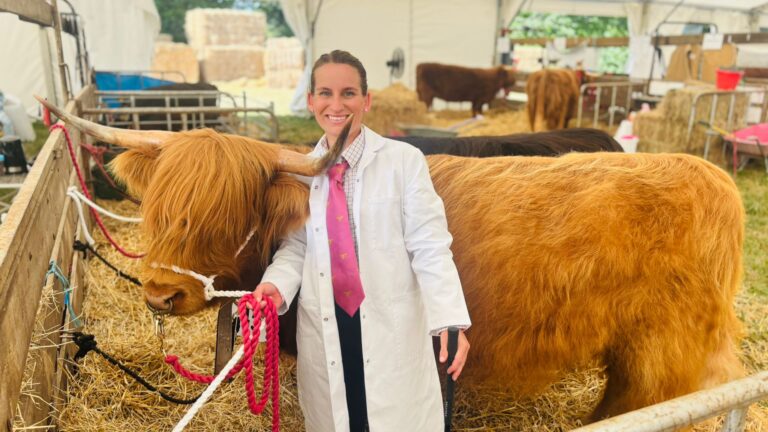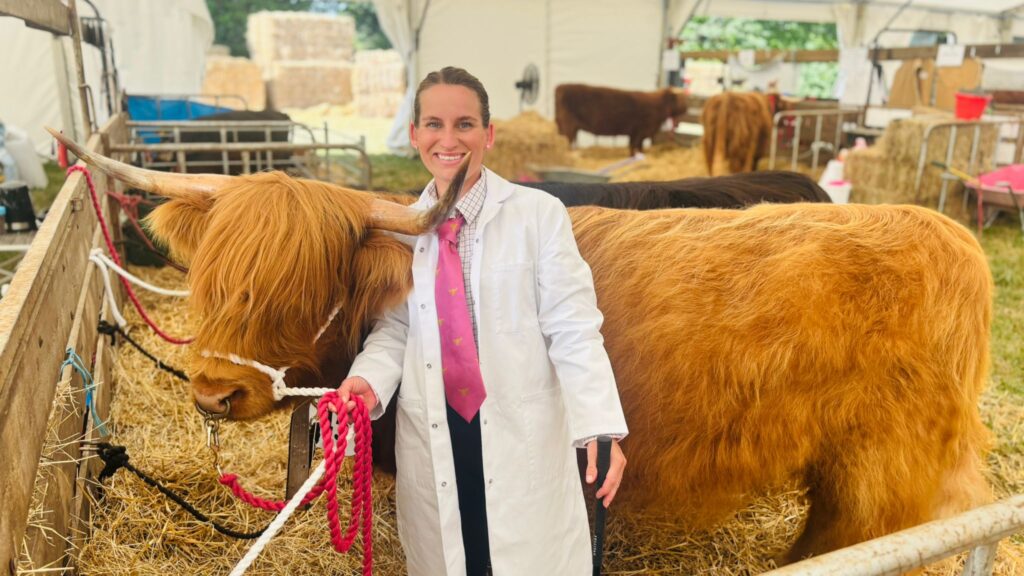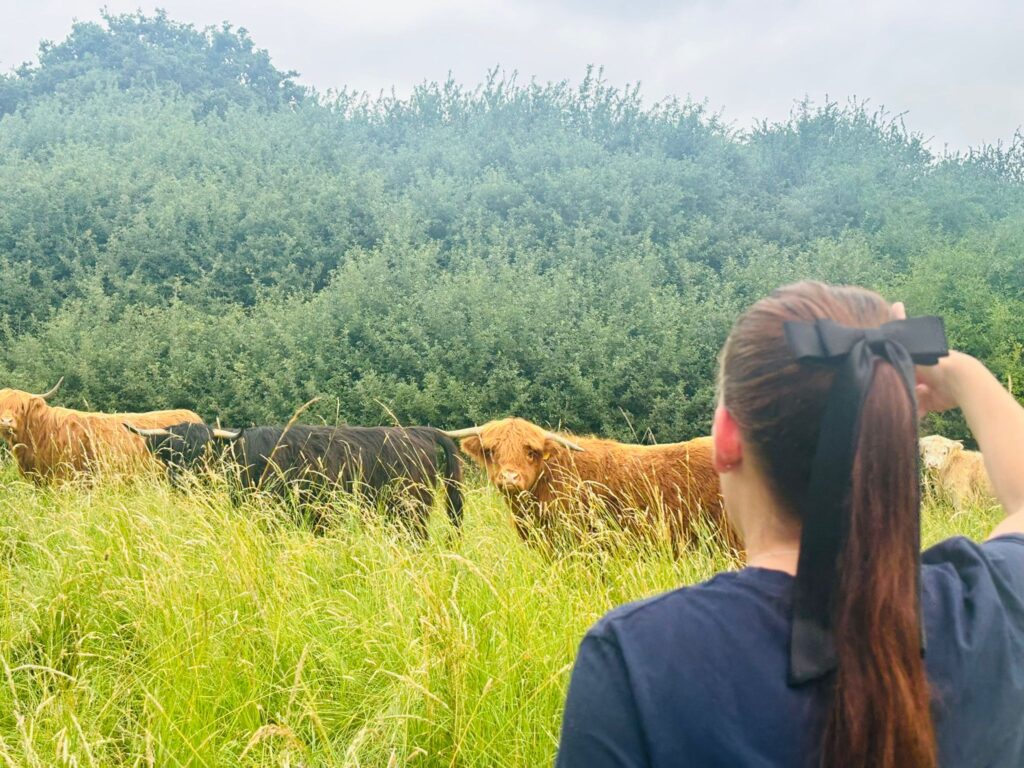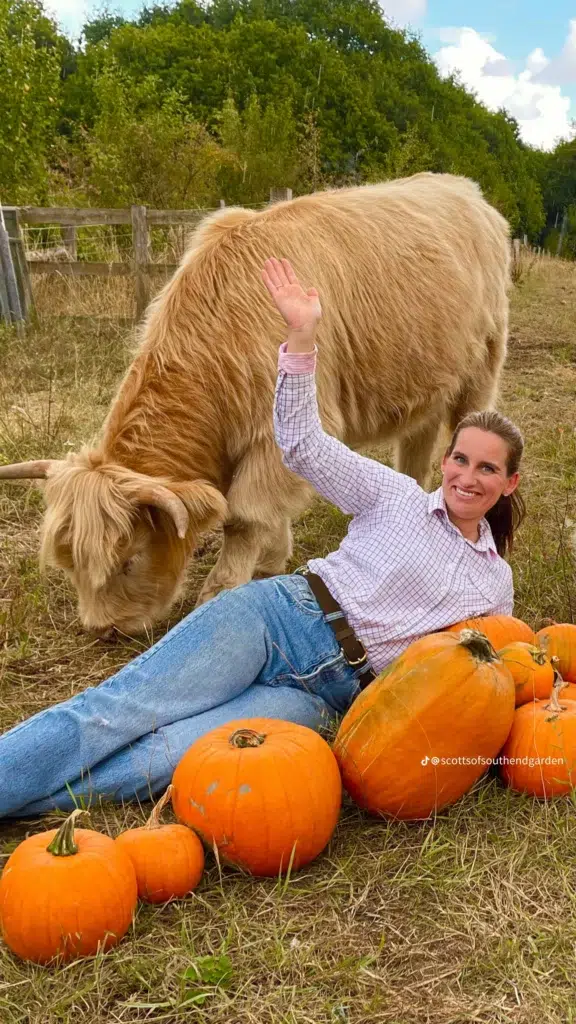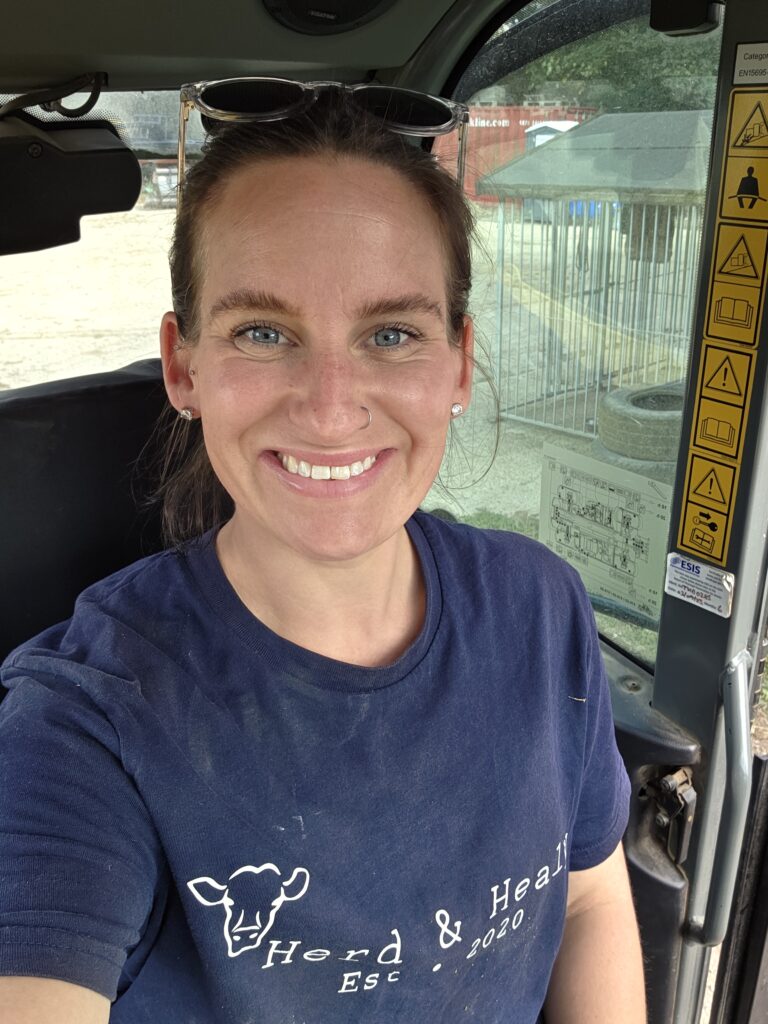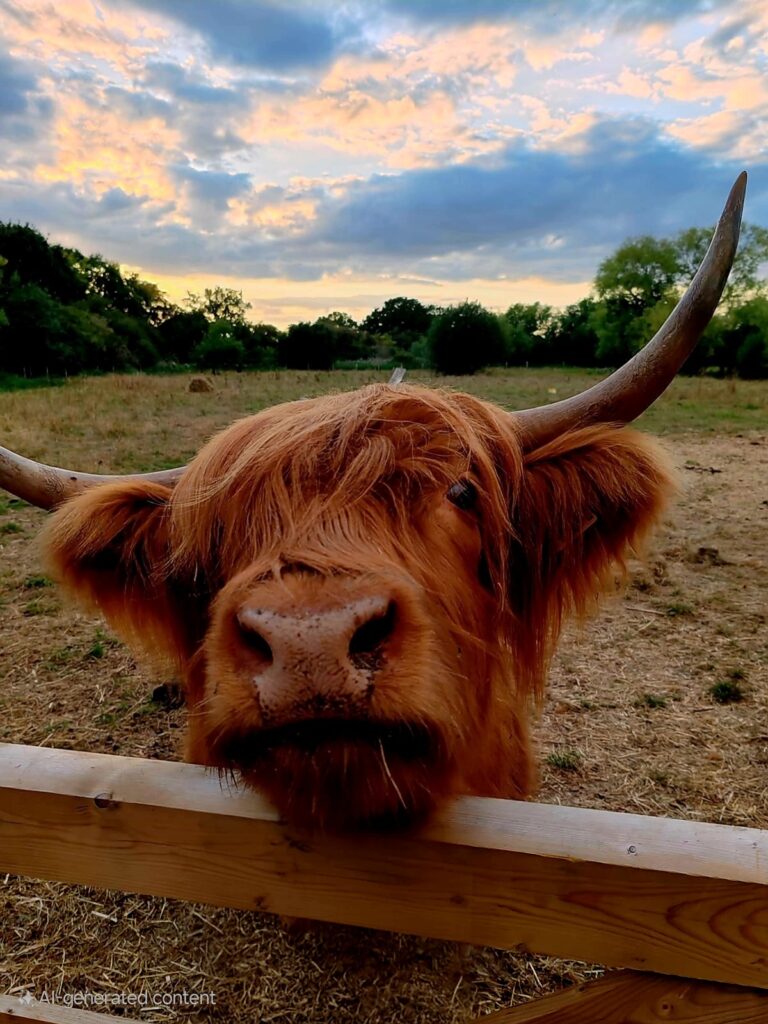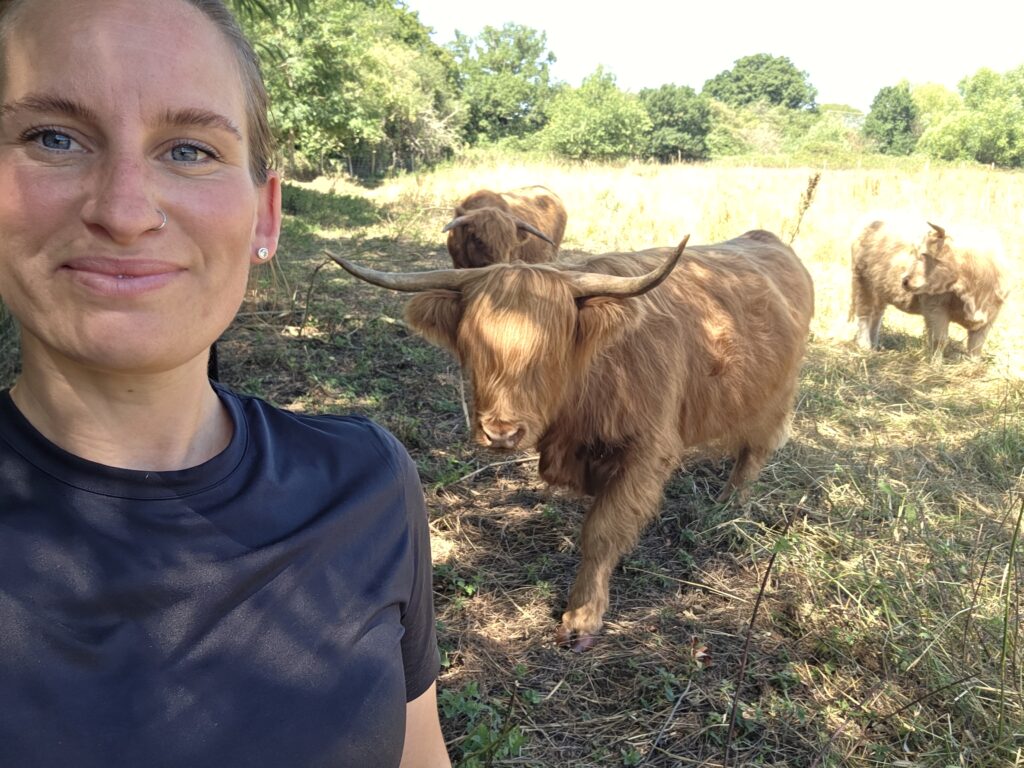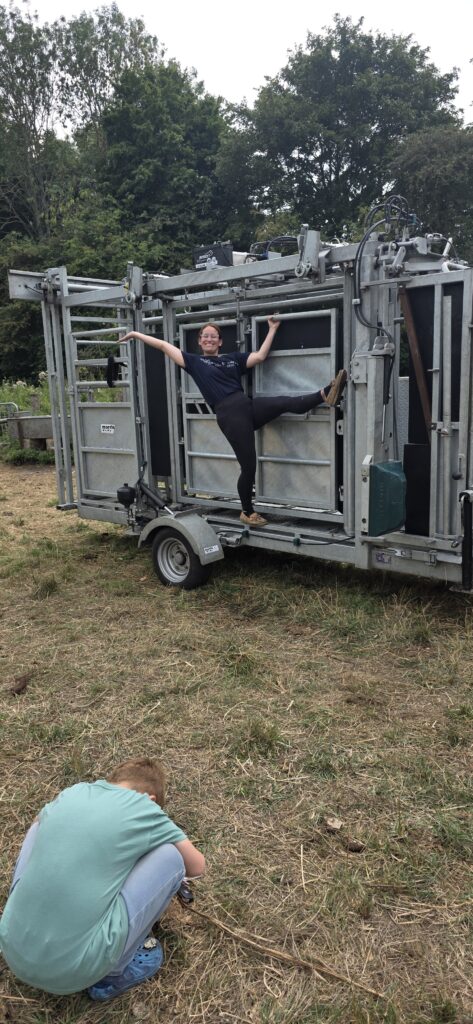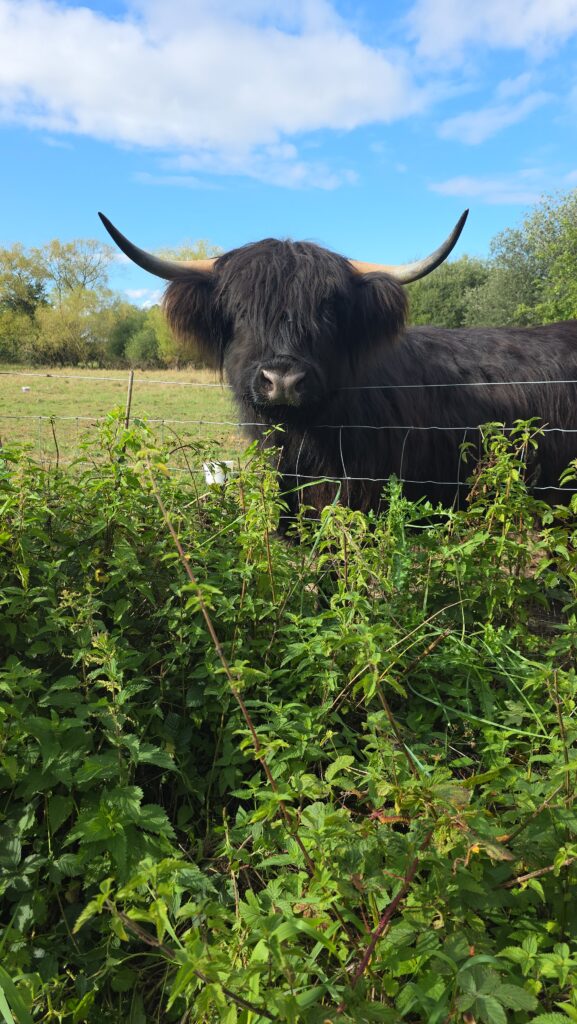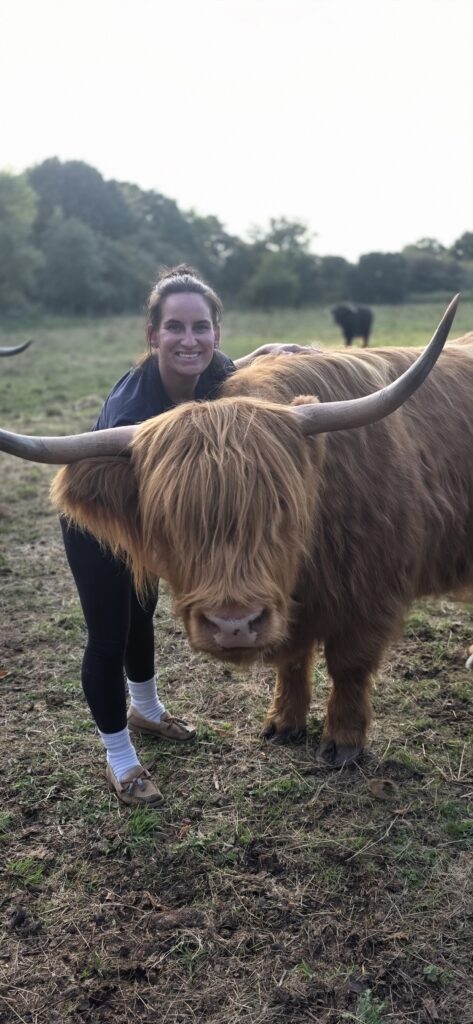As part of our campaign to support British farming, we created this blog to provide farmers with a platform to share their stories and experiences, offering insights beyond what you see on their Instagram accounts. Read below to take a walk in Chloe’s (@chloe_at_the_farm) wellies, a small holder who tells us all we need to know about owning highland cattle…
My name is Chloe Lucas aka the crazy highland cow lady since 2022! I live in a suburban area in Essex called Basildon.
What kind of farm do you work on?
I work with Highland cattle which are currently used for natural grazing across three bits of land in Essex as part of the Natural England project for restoration and encouraging biodiversity and regenerative farming. I also work on a dairy farm in Devon and help on other farms around Essex which are both beef and sheep farming.
How did you first get into farming/small holding? Is it a family business or something you started on your own?
I had a mental breakdown due to covid. I am a children’s nurse and work for the NHS. I was re-deployed to help on the adult wards and went to ITU to support. I watched the patients who were on ventilators say goodbye to their loved ones on mobile phones and iPad’s. I watched them deteriorate over the time I worked there and they all sadly passed away. This was the worst thing I had ever experienced and being unable to save them, seeing the struggles of the families, nurses and doctors and I ended up having a nervous breakdown. I was signed off for three months and had counselling, psychology assessment’s and was medicated. I didn’t leave my home for 6 weeks so warmed to watching telly. I rarely watched the telly due to being outside and on the go all the time. I warmed to Countryfile, my farming life and of course Jeremy Clarkson’s farm. Jeremy showcased farming in a way that made me want to dig deeper and learn more. I now had a purpose and it kept my mind busy and was a huge part of my recovery. I started wondering, where does my food actually come from? What do farmers have to do on a daily basis to produce our food? What was involved in this process. It was at that moment I had this fire in my belly to want to learn more about this industry.
When I started getting better, I went to the Cotswolds and visited Clarkson’s farm and it was then I knew what I wanted to do. I wanted to be a farmer! I wanted to be knee deep in all things farming, I wanted to learn, grow and connect with the industry. I dropped a shift in the NHS and only do 2 days a week now. I went round my local area posting letter through what I thought were farmers doors (they were houses attached to bits of land or had a barn next to it) so I went for it. I stopped tractors and asked for advice in to farming (they thought I was mad) I guess I was! I posted on social media and did some research. After 6 weeks I got my first voluntary job on a beef and sheep farm. And the rest is as they say….. history. I am from a non-farming background I never knew anything about farming before this. I travelled to Devon, Norfolk, Kent and farms around Essex and volunteered. I started this up on my own and 3 years later I now own my own small holding of the most beautiful Highland cattle.
Can you share a bit about the history of your small holding – how long it’s been running and how it has evolved over time?
I started off with two highland heifers who at the time were 9 months old, they are now 3 years. I wanted to experience life as a farmer, the highs, lows, struggles and the wins. I wanted to see what it was like to start something from nothing so I could eventually support others who wanted to go In the same direction and having that experience will help me support them. It has been three years since I started this journey and around 2.5 years since owning my highlands. We started on some marsh land but I wanted to go solo. I had been approached by the local council who had 2 meadows they wanted to graze naturally as part of Natural England. They asked me if I would trial my highlands as part of the conservational grazing which I absolutely accepted! I now have 5 highland heifers and a bull who is hopefully going to help me increase my fold numbers next year.
I also have another meadow which is private and owned by a lovely couple who wanted to help and also have their land managed naturally rather than the use of machines. Although these meadows are only small, they are perfect for me at the moment and I am hoping to improve soil health and improve wildlife. I also invite the public to try and educate and explain what farmers do to put food on the table. The public come and meet my Highlands, learn about the breed, what they do for the environment and also the struggles I face. It is my way of giving back to the farming community and also to showcase what we do and bridge that gap between suburban and rural areas. I now have volunteers who help me, they are also from a non-farming background with little knowledge before they started to get involved with the new adventure and some are also from the NHS.
What led you to decide to keep highland cattle and what is it like working with them?
I have always been fascinated by cows, their temperaments, the way they move, graze and how happy they make me and many others it seems. But Highland cattle are not only majestic they are a beautiful breed inside and out. They have a gentle nature; they are a hardy breed and can withstand the cold weathers. They are light on their feet and graze well on rough land. I wanted Highlands because of their horns, their stunning coats and because they are the most docile of cattle. I love a challenge! I wanted to be part of the highland cattle society, to sharer these rare breeds with the public but to also enjoy looking after one specific breed of cattle. They are a delight to work with. They all have their own personalities; they are honestly the most incredible creatures.
Do you do anything outside of running your small holding?
Yes, I do, I work as a children’s nurse and also work at a farm park helping with events, and as an assistant in the education department. We teach primary schools where their food comes from by cooking, farming activities and an educated walk around the farm park meeting all the different animals. I am also a mum of two boys so have a pretty busy life, which I love.
How many Highland cattle do you currently keep, and do you have a favourite?
I have 5 highlands currently and a Bull who is running along side two of my bigger girls in the hope we can increase our fold numbers next year! Highland babies have been a dream of mine so let’s hope we get those big fluffy ears soon. I adore all of them but Isla and Catriona were my first Highlands so they will always have a special place in my heart. Isla is the boss and I lover her attitude. Even if she does try to horn me most days!
What are some unique traits or behaviours you’ve noticed in Highland cattle compared to other breeds?
They are one of the most docile breeds of cattle. They are able to live outside all year round due to being a Scottish breed and withstanding the cold weather. They do not need as much maintenance as other cattle who need housing over the winter periods. They are easy grazers and very good at foraging for their food. They can live on marshland which means they are good on the rough ground. They have a unique look which makes them stand out from other cattle.
How do you manage their diet and grazing throughout the year?
They graze the land through the summer and over winter we replenish with hay, hard feed and the occasional vegetable as a treat. They graze three meadows so they rotate between the meadows to help with grazing, grass growth, and help keep good condition of those bits of land. I am very new to the industry so its all dependent on the weather, if there has been a drought then I will give them hay. It is all trial and error. The more you get to know your livestock you know if they are hunger, under conditioned or over conditioned.
How do you ensure the health and well-being of your cows?
I have their poo tested regularly, which I never knew would be such a vital part of their health. Their stomach which is four parts can tell an awful lot about their health. I have a vet visit once a year to check their health and wellbeing. I treat them for worms, ticks and lice when needed. I try not to overtreat as I don’t want them to build an immunity to it. I make sure they are checked every day, they have fresh clean water, good living environment and access to food. They have their hoofs trimmed and I also had my first experience of TB testing as I am classed a new keeper and we passed. That was the most terrifying experience and the reality of what farming is. I am always checking them over, making sure they are in good health. I chose to keep them so it is my responsibility to care for them correctly and maintain good health. Happy cows happy farmer.
What kind of infrastructure or equipment is essential for keeping Highland cattle?
Fencing!!! I can not express how hight important it is to have adequate fencing and I speak from experience. As in my Cattle escaping because the fencing was rubbish (new farmer alert) you need a good structure, adequate land for them to graze. Food, hay and straw. Treatments for worming, ticks and lice. I started with nothing and now have a shed full of gadgets from fence checkers, to shampoo, brushes to antiseptic spray, halters to hurdles and gates. It isn’t something you need to have straight away. Farming is a process and I have purchased different things as time has gone on.
I don’t own a cattle crush or a ring feeder; I don’t have a truck or a trailer but I do get by. It is a struggle but being self-funded means, it will take me a lot longer to get there and that’s ok. I don’t have any out buildings so the cattle will house under the trees and in the forestry areas. We don’t have access to electricity on two of the meadows which we don’t really need but the other meadow we have access so that’s where we do a lot of the hoof trimming, washing and electric fencing.
What are the biggest challenges you face with keeping Highland cattle in the British climate?
The weather has been a challenge this year, I started to feed a lot earlier than normal and have been worried about sourcing hay over the colder months. I am lucky that Highlands are hardy creatures so are able to forage on bleaker bits of land and still manage to source food. The summer we had was really hot this year and my highlands suffered heat stress a couple of times. It is about making sure you have a plan in place and a risk assessment for these kinds of events.
I know accept that we live in a country where the weather is unpredictable and I deal with it as it comes. It is something out of our control and although it is a high stress factor for farmers it is what it is. It’s difficult when the land is too wet or too dry and cattle need to be moved to ensure the land can rest but with lack of equipment, I have to rely on others to help, which isn’t always that straightforward due to farmers also being busy with their own job. Finances is a real struggle as I farm on a small scale and self-funded, I have to work other jobs to fund my small holding. Lack of equipment has been a real struggle at times and the land not being mine has meant I haven’t got any storage.
What advice would you give someone considering starting with Highland cattle?
I would say, if they can go and volunteer on farms first. Get a feel for what its like to look after cattle. If you can work with highlands even better but cattle alone will be a great insite to what’s involved. Do your research so you know and understand what level of care they require and the involvement. Reach out to others, connect with people and communicate, ask for advice or help from experienced farmers to get different points of view. Farming is a privilege, a way of life it is something you need to be invested in with your whole heart. It is such an emotional roller coaster so you must make sure it’s something you really want to do. Highlands get big, although one of the smaller breeds their horns make up for it.
What are the key qualities needed to do your job?
Determination, drive, passion and consistency. Not giving up even with you feel like it, which in the industry is probably something I feel weekly! Love, confidence (although I lack that a lot but you really have to believe in yourself) to work as a team and alone, communicate with others and reach out of for help. You just have to be a someone who doesn’t give up at the first hurdle. Forward thinking and planning, having a back up plan if something doesn’t go right.
What are some unique challenges you face as a small holder compared to other types of farming?
Everything falls on you. You are the boss the one in charge. The paper work, the bills, organising everything, juggling, chasing, keeping the cows moving its all on you. I don’t have anyone who takes over. I am lucky to have some amazing volunteers but I would not expect them to take over. Bigger or more commercial farms have more people with individual roles, someone will do the books, the other farmers, someone else controls the social and public side. I ama aware they are on a much bigger scale so there is much more involved but they probably have a better system in pace due to having more equipment, support and funding.
Do you keep any other animals or grow crops alongside your cattle?
I only keep my highlands who I am in the process of breeding to increase fold numbers. I don’t want to do too much and then be unable to cope or care for them properly. I haven’t had much experience with the arable side of farming but this is something I might like to try in the future.
Briefly describe a typical working day (e.g. what time do you get up, have breakfast, round the sheep up etc).
Most days start early in my house. The alarm goes off around 6am and the snooze button becomes my best friend, and before I know it I have snoozed too much, and I’m thrown into the morning rush – breakfast, uniforms, packed lunches, and making sure my son has everything he needs for school. There’s always a little bit of chaos mixed in with the cuddles, but we get there in the end. Then it’s off on the school run.
Once he’s dropped off, I head back home, grab the dog, and make my way to the farm. That’s where my real work begins. The first job is feeding them and checking water troughs. Then come the usual chores: brushing, checking fences, and making sure everyone is healthy and happy. No two mornings are ever quite the same, sometimes I have to order in hay or food to go and collect, or I need to alter something on the farm. It all depends on the day. but the routine of caring for the animals and being outdoors gives me such a sense of purpose.
By the time I head back home, I’m usually ready for something to eat. Then it’s onto the housework — washing, tidying, and all the day-to-day bits that keep family life ticking over.
The afternoon creeps up quickly, and before I know it, it’s time for the school run again. Evenings are a juggle of dinner, bath time, and squeezing in a little computer work – catching up on messages, organising farm things, or just ticking off a few jobs.
Finally, with everything ready for the next day, I get to put my feet up. A quiet cuppa in hand is my way of drawing a line under the busyness, reflecting on the day, and enjoying a few peaceful minutes before bed.
Life can feel full-on, balancing motherhood, the farm, and the home, but I wouldn’t change it for the world. Each day is different, but they’re all stitched together with love, hard work, and plenty of muddy boots, unless I’m nursing then that’s a whole different day!
Have you always felt supported when learning and on the job?
I would say a strong 90% support from others in this industry. I found the farming industry was very male dominated and although I felt supported at times it wasn’t always the case and I have also felt unsupported by some women in farming too. I understand how much farmers struggle and how much they juggle on a daily basis they can’t always be there supporting others all the time. Although I do believe they can teach others the true meaning of farming but sometimes it doesn’t always work that way. Rececntly there have been a lot more women entering the farming industry and I think it’s amazing, we are being a lot more supported and I have incredible support now from both.
What would you say to other people thinking of becoming a small holder?
Make sure you have a small network of people before you start your small holding. Make sure you have the foundations set up and ready to go. It is impossible to do it completely alone so ensuring you a have a small team will really have a positive impact on your journey. If you want it bad enough you will make it work and feel so proud of the end results. You need to be able to connect with other farmers whom some will become lifelong friends even if they are through social platforms. The more you talk and reach out the wider your community base becomes. You need time to have a small holding, adequate land and access to resources. I came from no knowledge prior to starting my small holding and I learnt by volunteering on various farms. This gave me a good idea whether it was for me or not.
What job opportunities are available for somebody wanting to enter the trade?
I found the industry to be quite a closed one at first but with sheer determination and a bit of madness I did manage to get a lot farming experience. I do believe volunteering is the way forward. The opportunities depend on what avenue of farming is being sought after. There are free courses, online help and different farming platforms. As long as you are confident to reach out and ask for help and direction then people will be happy to help.
What’s the most rewarding part of being a smallholder?
For me personally it’s having that connection with my highlands, these are large animals and we have a mutual understanding of each other, they are all individual, with their own personalities. They never fail to make me smile. I love the challenge the brain storming, always having something to do. The opportunities I have had since doing this has been so overwhelming. Appearing on television, magazines, podcasts, farming events, nominations for awards. It has given the chance to share my unique story and for me that is the most rewarding thing I can ask for.
What are your hopes for the future of your farm?
I hope to breed my highlands, to continue to showcase their incredible breed to the public. To continue to show them around the country and one day farm on a bigger scale with land big enough, equipment to enable me to be more independent and showcase a more sustainable farm. To encourage others who are wanting to start this similar journey by inviting them on farm for work experience and a learning opportunity. I want everyone to feel included from a mental health perspective, education perspective and new opportunities they may not get elsewhere.
If you’re a farmer and you’d like to contribute in our campaign to raise awareness for the incredible work in British agriculture, please drop us a DM on Instagram – @_howdenrural

